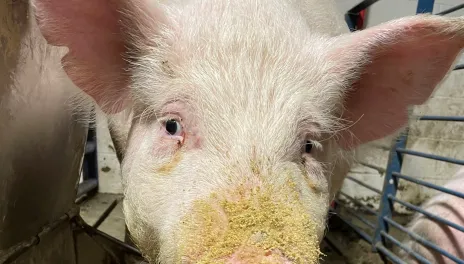NDSU Pigs Help Scientists Understand More About Ketogenic Diet
According to the 2020-2025 Dietary Guidelines for Americans, the combination of food and nutrients consumed by humans have a collaborative and accumulative effect on their health and disease risk.
The growing concern for metabolic diseases and obesity has helped develop the creation of popular diets as healthier alternatives to the standard Western diet. One of most popular diets among adults is the ketogenic diet where carbohydrates used for energy are replaced by fat sources.
A classic ketogenic diet is defined as very low carbohydrate (<50g per day or 10% of daily energy intake) and high fat (>75% of total energy). It is primarily composed of high-fat and protein-rich foods such as meat, poultry, fish, eggs, nuts, seeds and oils, while grain products, fruits, starchy vegetables, and sugar-containing products are avoided.
Scientists at North Dakota State University wanting to learn about the effects of ketogenesis turned to pigs to help them understand more. A recent study examined 15 female pigs (gilts) that were fed either a balanced, traditional diet containing corn as an energy source, or a ketogenic diet using beef tallow as an energy source.
The 28-day research project found that:
- Body weight remained stable for the pigs on the ketogenic diet while the pigs fed the traditional corn/soybean diet continued to gain weight.
- External fat (subcutaneous fat) increased on the corn-fed pigs (but not a statistically significant amount), while over time, the pigs on the ketogenic diet lost backfat (significantly).
- The pigs fed the ketogenic diet had less intramuscular fat in the loin muscle. Accumulation of intramuscular fat in humans is an indication of pre-diabetes and metabolic syndrome.
- Pigs fed the ketogenic diet had less abdominal fat, which is associated with many metabolic disorders.
“The National Institute of Health notes that pigs are the best model for studying how food influences physiology, as pigs and humans have the same physiological response to food — both are simple stomached omnivores,” says Chris Byrd, NDSU Department of Animal Sciences assistant professor and co-principal investigator of the research.
“This research is helping us to understand more about the role of meat in the human diet as a means to optimize health and wellbeing,” says Eric Berg, NDSU Animal Sciences professor and co-principal investigator. “With the end goal being increasing knowledge and awareness of the benefits of consuming meat and other animal products.”
FOR MORE INFORMATION:
Chris Byrd, 701-231-5363, christopher.byrd@ndsu.edu
Eric Berg, 701-231-6271, eric.p.berg@ndsu.edu

